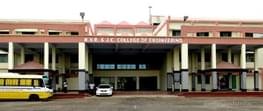Dr. Kodukula Subrahmanyam, a Gold Medalist from Andhra University (1992-93) is currently working as Director- PG Studies, and Principal, CoS, K L University, Vaddeswarm, Guntur. He has been in the teaching profession for the past 30 years and prior to joining KLEF he worked as Programme Leader in the School of Engineering, Science and Technology at KDU University, Malaysia for about 10 years. While working in Malaysia, Prof. Subrahmanyam has been associated with many reputed Universities like Carnegie Melon University (USA), Murdoch University, Monash University (Australia), and Northumbria University (UK) and gained international exposure to various teaching, and learning pedagogies. He is the Founder Chairman of ACM Amaravathi Chapter and an active member of other professional societies like CSI, IEEE & CSTA, etc. He has published more than 100 research papers in both National and international journals/conferences and attended various workshops/conferences in Malaysia, Singapore, the USA, and India. He has obtained a number of research grants as Principal Investigator from both Government and NGOs including DST-SEED, INSPIRE, SERB & AICTE. He has been recognized as the Best Teacher by both KDU, Malaysia, and KLU, India several times. His achievements have been recognized by BEEA and given him BHEESHMA ACHARAYA AWARD in September 2022. His research interests include Knowledge Engineering, Software Engineering & IoT. He has guided 10 scholars towards their Ph.D.

You have held key positions at various prestigious institutions throughout your career. What is that one thing that made you excited and walk with KL University in the journey?
Student care is taken from the beginning through a process called SWEAR (Strengths, Weaknesses, Eligibility, Availability, Resources) and providing the necessary support throughout, until he/she achieves the goal. In this process, several initiatives like providing Campus Recruitment Training from the 1st year, and giving them access to various hobby clubs, Entrepreneurship cells, Coding clubs, Global challenges, National level hackathons, really make me feel proud to be part of such wonderful institution.
What motivated you to pursue a career in the science domain and become the principal of KL University School of Science?
Science, Technology and Engineering are inseparable domains. Any engineering innovation definitely depends on science. Being a Mathematician and a gold medalist from the prestigious Andhra University, I have developed interest in Computer Science and advanced my career. With that passion, I took charge as a Principal at the College of Sciences and established computational thinking power in all sorts of Science programs.
How do you stay current with the latest trends and developments in the field of Sciences and incorporate them into the curriculum and programs offered by KL University?
We have initiated three different programs in the college, which are inline with the current trends, apart from the technology-driven BCA and MCA programs. The first among them is an M.Sc. - Nano Science and Technology. We can proudly say that KL is the first institute in both Telugu states to offer such a novel program. Through M.Sc.- Computational Mathematics we would like to combine the power of mathematics with Computer Science, the graduates of which are well required by industry. The Department of Chemistry has initiated a new and versatile program MSc-Digital Chemistry to cater to the needs of pharma and other industries.
Check KL University Courses & Fees
How well is KL University focusing on maintaining industry relationships with companies in order to leverage them for live projects, training, and placements for the students?
We collaborate with the industry starting from the development of the curriculum. We invite a couple of industry experts to our Board of Studies (BOS) along with Academia to get their input on the curriculum. Based on suggestions, the topics/courses are being added to the curriculum. Industry experts will also handle few guest lectures during the course of delivery. A few of them were recruited as Professor of Practice (PoP) as per the new NEP-2020. We make several MOUs with industry for cooperation in terms of training/ placements/ projects, etc. A few popular industries/research labs with KL Collaboration are Laurus Labs, Hyderabad, GBS Life Sciences LLP, Hyderabad, Sri Niketh Research Labs, Hyderabad, HCL Technologies, Bangalore, IIT Gandhi Nagar Research Labs, etc.
Can you share examples of successful collaborations or partnerships between the School of Science and external organizations, such as industry, government, or research institutes?
Collaboration between KL College of Science and external organizations/ research labs is highly successful and mutually beneficial. Such partnerships lead to advancements in research, drug development, education, and the advancement of scientific knowledge. Here are some examples of successful collaborations. Academic institutions often have cutting-edge research facilities and expertise in various scientific fields. Pharmaceutical companies have collaborated to research new drugs, therapies, or medical devices. These collaborations can result in groundbreaking discoveries and the development of innovative medical treatments. The College of Science is sending students to work with industry partners through internships and co-op programs. These experiences provide students with practical skills and insights into industry operations. Research partners are sponsoring scientific conferences and symposia and submitting proposals/papers.
What do you believe are the emerging trends or challenges in the field of science education and what are your thoughts on the scope of Science programs in the future?
As already mentioned, Science and Technology will play an important role in the future. If you run Pure Science courses like Physics, Mathematics or Chemistry, the industry may not require them. You need to revolutionize the programs to suit the needs of society/industry. For example, the future generation requires cyber security, Artificial Intelligence, and Data Science aspects. They all require a solid mathematical background. Hence, we designed Computational Mathematics. Nanomaterials and nanotechnology will play a crucial role in the future in all sectors. So programs like Nano Science and Technology are to be encouraged.
How would you promote experiential learning and practical application of knowledge within the School of Science?
At the College of Sciences, KLU we believe much in learning by doing. Thus, in every semester students will be doing a minimum of 3-4 courses with practical components. Apart from practical sessions, they will also be doing skilling components in a couple of courses. Also, every year they will complete internships in the industry, to gain further practical exposure and practice the things learned.
What kind of steps KL University is taking in order to bridge the gap between academia and the real industry world?
KLU strongly believes that involving industry experts in curriculum design and taking their input in the preparation of topics/ courses/ programs reduces the gap between industry and academia. The regular visits by industry experts to the campus to provide guest lectures/ training/ placement opportunities and the internship visits by students to the industry will surely help to overcome this problem.

![K L University - [KLU]](https://image-static.collegedunia.com/public/college_data/images/logos/1619098261Logo.jpg?h=71.7&w=71.7&mode=stretch)
.png?h=132&w=263&mode=stretch)






.png?h=78&w=78&mode=stretch)



.jpeg?h=78&w=78&mode=stretch)




![NRI Institute of Technology - [NRIIT]](https://image-static.collegedunia.com/public/college_data/images/appImage/28811_b-3.jpg?h=111.44&w=263&mode=stretch)



![KKR & KSR Institute of Technology and Sciences - [KITS]](https://image-static.collegedunia.com/public/college_data/images/appImage/28565_app imagegf.png?h=111.44&w=263&mode=stretch)

![Bapatla Engineering College - [BEC]](https://image-static.collegedunia.com/public/college_data/images/appImage/12998_00B.jpg?h=111.44&w=263&mode=stretch)













![K L University Business School - [KLUBS]](https://image-static.collegedunia.com/public/college_data/images/logos/1619156518Logo.jpg?h=72&w=72&mode=stretch)
![K L University - [KLH]](https://image-static.collegedunia.com/public/college_data/images/logos/1619089090Logo.png?h=72&w=72&mode=stretch)

.png?h=72&w=72&mode=stretch)

.jpeg?h=72&w=72&mode=stretch)





.png?h=72&w=72&mode=stretch)
.png?h=72&w=72&mode=stretch)
.png?h=72&w=72&mode=stretch)
.png?h=72&w=72&mode=stretch)

![VIT University - [VIT- AP]](https://image-static.collegedunia.com/public/college_data/images/logos/1615969516Screenshot20210317134244.png?h=72&w=72&mode=stretch)
![Mohan Babu University - [MBU]](https://image-static.collegedunia.com/public/college_data/images/logos/1650533803logo200.png?h=72&w=72&mode=stretch)


![Jawaharlal Nehru Technological University - [JNTUK]](https://image-static.collegedunia.com/public/college_data/images/logos/uv25360.jpg?h=72&w=72&mode=stretch)
![Andhra University, College of Engineering - [AUCE]](https://image-static.collegedunia.com/public/college_data/images/logos/1756446694Header.png?h=72&w=72&mode=stretch)
![Acharya Nagarjuna University - [ANU]](https://image-static.collegedunia.com/public/college_data/images/logos/15087556111394863761AcharyaNagarjunaUniversity.png?h=72&w=72&mode=stretch)
![Andhra Loyola College - [ALC]](https://image-static.collegedunia.com/public/college_data/images/logos/1753100380collnewlogo.png?h=72&w=72&mode=stretch)

![Sri Venkateswara University - [SVU]](https://image-static.collegedunia.com/public/college_data/images/logos/1480418256thumb.jpg?h=72&w=72&mode=stretch)






Comments